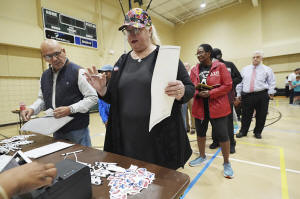GOP pushes ahead with citizenship voting bill. Some state election
officials say it's problematic
[March 03, 2025]
By CHRISTINA A. CASSIDY
WASHINGTON (AP) — The centerpiece election legislation from
congressional Republicans would require voters to prove their
citizenship when registering, raising concerns among state election
officials about how it would be implemented and who would pay for it.
In recent interviews, secretaries of state from both parties said they
were wary of federal lawmakers creating state election rules and of
costly new procedures that would come with them, including collecting
and storing sensitive documents. They also criticized a provision that
would allow for civil or criminal penalties against any election
official who registers someone without evidence of citizenship.
Maine Secretary of State Shenna Bellows said there is no federal
database that states can use to confirm a person's citizenship status.
Election officials described databases maintained by the Social Security
Administration and Department of Homeland Security as unreliable.
“Reasonable people can agree that only citizens should be voting in our
elections,” said Bellows, a Democrat. “If they want us to prove
citizenship, then they need to build the infrastructure for that to
happen.”
House Republicans are ready to act quickly
With the urging of President Donald Trump, House Republicans are
expected to move quickly to advance the legislation, known as the
Safeguard American Voter Eligibility Act. A proof of citizenship
requirement was included in a package of priority bills that can bypass
committee and head straight to a floor vote. That could happen as soon
as this week, though the bill’s prospects in the Senate are uncertain
amid likely Democratic opposition.

State election officials said they generally support steps to ensure
that only U.S. citizens are voting, an issue that typically involves a
tiny fraction of ballots and is more often an individual mistake rather
than an intentional and coordinated attempt to subvert an election.
Debates largely center on how best to accomplish that, whether the
responsibility should fall on the voter or whether the federal
government should do a better job providing states with reliable data to
verify citizenship status.
“Every time there’s federal legislation, I’ve got concerns, especially
when the feds talk about things that the states typically do on a
year-by-year, day-to-day basis,” said Kansas Secretary of State Scott
Schwab, a Republican. “Just because you think it’ll work in your state
doesn’t mean it will work in everybody else’s state.”
Republicans in Congress have said the current process for registering
voters is filled with loopholes that have allowed people who are not
U.S. citizens to vote in past elections and relies on a system in which
voters sign an oath that they are a citizen.
Before the 2024 election, Trump pushed claims without evidence that such
people might vote in large enough numbers to sway the outcome. In fact,
voting by noncitizens is rare and can lead to felony charges and
deportation.
Since his victory in November, Trump has continued to press for changes
to how elections are run, including requiring proof of citizenship.
No money included and the threat of prosecution
Utah Lt. Gov. Deidre Henderson, a Republican who oversees elections in
her state, said she was concerned about federal overreach and the
legislation lacking the support states will need to make it work.
"It definitely shouldn’t be on throwing election workers or secretaries
of state or county clerks in jail for accidentally registering a
noncitizen to vote when we don’t have adequate tools to even verify
citizenship,” she said.
Another concern is funding. The bill does not include an appropriation,
leaving states to cover the costs of its implementation. Federal money
for elections has long been a point of contention for some election
officials.

[to top of second column]
|

Blythe Gonzalez, right, asks a question of a Jackson, Miss.,
precinct worker, unseen, while her husband Jorge Gonzalez, left,
waits with his paper ballot, to accompany her to a voting kiosk,
Nov. 5, 2024. (AP Rogelio V. Solis, File)

“If you talk to the vast majority of election officials, they will
tell you that federal investment in our elections is sorely needed,
especially if folks in Congress are going to be talking about things
like the SAVE Act, which will only increase costs of running
elections and increase federal oversight and involvement in our
elections,” said Michigan Secretary of State Jocelyn Benson, a
Democrat.
Concerns about voters having the right documents
Voting rights groups have said married women who have changed their
name could have trouble registering under the SAVE Act because their
birth certificate lists their maiden name.
Those groups also have criticized the bill's requirement that people
provide documents in person, saying that could be a challenge for
people in rural parts of the country where visiting an election
office might require a long drive and taking time off from work.
Under the current registration system, those seeking to register are
asked to provide either a state driver’s license number or the last
four digits of their Social Security number and are directed to sign
an oath swearing they are a U.S. citizen. A few states require a
full Social Security number.
Republicans say states can add people to the voter rolls even if
they do not provide that information and that some noncitizens can
receive Social Security numbers and driver’s licenses. The
legislation outlines documents that could prove citizenship,
including a REAL ID-compliant driver’s license, a passport or a
birth certificate.
It also allows for states to establish a way for voters to provide
other supporting documents. Only about 50% of Americans have a
passport, and adoption of REAL ID has been slow. As of January 2024,
about 56% of driver’s licenses and IDs in the U.S. were REAL
ID-compliant, according to data collected by DHS.
State citizenship requirements have mixed results
Currently, eight states have laws requiring proof of citizenship for
voters while lawmakers in 17 states have introduced legislation this
year to add that requirement, according to the National Conference
of State Legislatures.
Experiences have been mixed. In Kansas, where a proof of citizenship
requirement was in effect for three years, the state’s own expert
estimated that almost all the roughly 30,000 people who were
prevented from registering to vote during that time were U.S.
citizens eligible to vote.

Georgia Secretary of State Brad Raffensperger, a Republican, has
said his state has been successful in establishing a system with the
state’s motor vehicle agency to verify citizenship. He and 20 other
Republican secretaries of state sent a letter this past week asking
the Department of Homeland Security to improve its database and
eliminate fees for using it.
Arizona Secretary of State Adrian Fontes, a Democrat, described
federal data as “totally unreliable” and pointed to an issue in his
state, which has for years sought to implement a state-level proof
of citizenship requirement. A recent state audit revealed instances
in which U.S. passports might not prove citizenship because U.S.
nationals – those born in U.S. territories – are eligible for
passports but are not eligible to vote in U.S. elections.
“We’ve got so many issues to deal with and such a poor understanding
of our own laws that I think a massive shift like this is just
problematic,” Fontes said. “I don’t think Congress has taken the
time to ask the folks who actually do this work if what they are
proposing is workable in the first place. And that’s dangerous,
especially when you are criminalizing some of these activities.”
All contents © copyright 2025 Associated Press. All rights reserved |